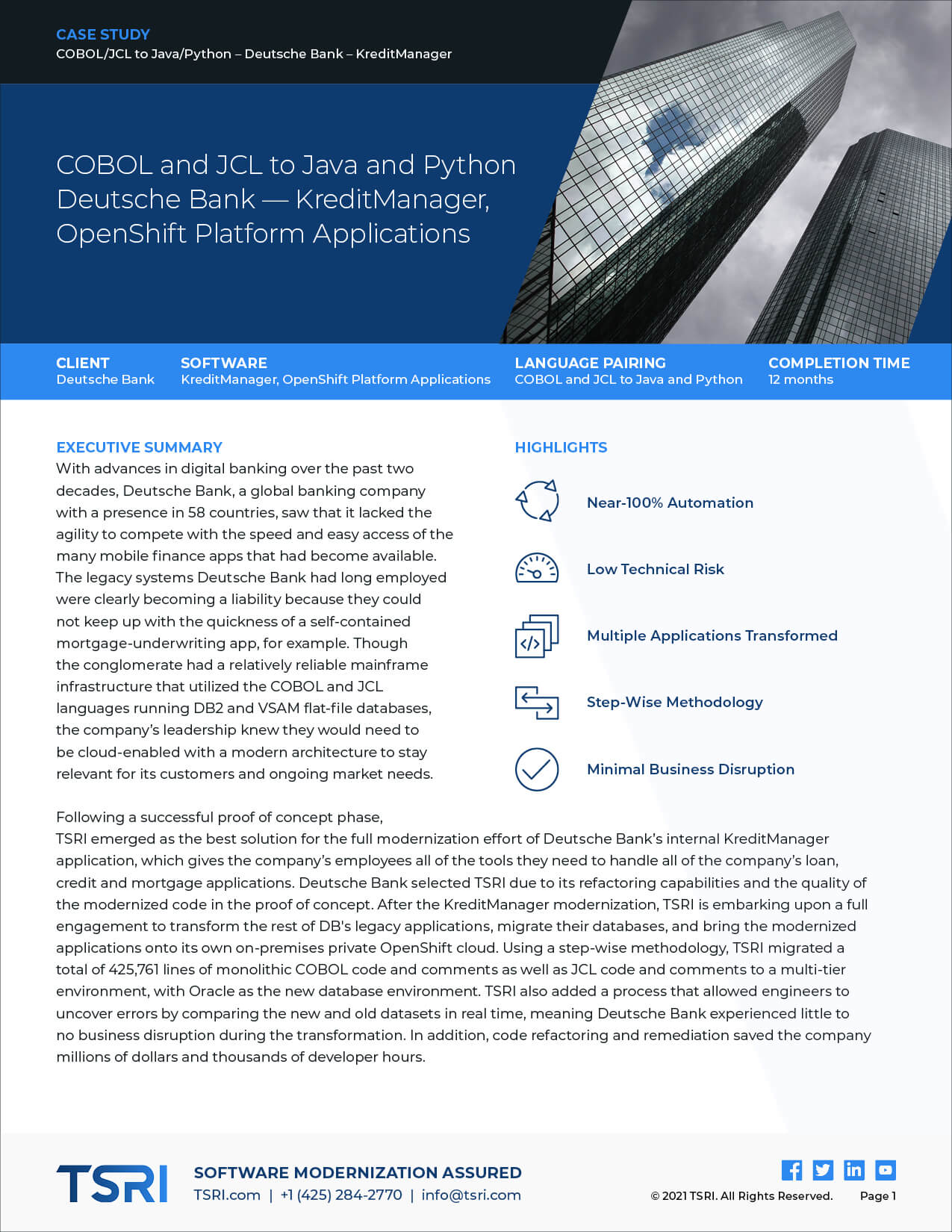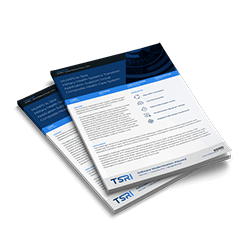Displaying items by tag: modernization
Modernize the code. Keep the brilliance.

How long would it take you to complete 25,000 tasks that take thirty minutes each?
Before you drag out your calculator, that’s 12,500 hours, or about 1,562 working days. Wouldn’t it be better to have it all done in under an hour? That gives you an idea of how refactoring—when done correctly—can accelerate modernization process and deliver accuracy in the range of just one error among 20,000 lines of code. That’s the kind of accuracy that’s needed for critical systems. Let’s talk about how refactoring achieves it so fast.
The refactoring phase of modernization at TSRI takes a project beyond updating the code and database to modern standards and system architecture. Sure, the planning, assessment, transformation, and integration phases of a modernization process get the mass of the work done. But more is needed. Imagine if a great painter only took a portrait to the point of getting the features in the right places. For functional equivalency, high performance, and future-readiness you need to dive into the details to get them as right as the original—and ready for future enhancements and needs.
That’s where refactoring can be hugely beneficial. If, after the transformation and integration phases you have to find and address each issue manually over hundreds of thousands or millions of lines of code, you may as well add those 12,500 or more hours back in. That’s why refactoring is key. By including an iterative code scanning and refactoring phase to the modernization process, TSRI automatically and semi-automatically remedies a host of issues at scale that would make developers run for the hills, including:
- Pinpointing and getting rid of dead or non-functional code
- Merging and consolidating duplicate code and data
- Improving design of code and data
- Eliminating system flaws from transformed software
"TSRI's refactoring process creates reusable components that can be applied to future projects"
And beyond those cleaning and refining functions, a well-designed refactoring process also provides forward-looking advantages. TSRI’s refactoring process improves maintainability, remediates security vulnerabilities, increases performance, and modularizes functionality. It also creates reusable components that can be applied to future projects for optimization, packaging, and redistribution.
When you’re able to reuse some or all of the outputs of automated or semi-automated refactoring, you don’t have to recreate the mechanisms for modern microservices, REST calls, and other reusable elements. They’re at your fingertips and ready for integration in modern environments or databases for future projects. It gives you the best of modularity, but customized and created specifically for your systems’ needs such as data-dictionaries, code and record consolidation, introduction of logging or comments, and more.
"It gives you the best of modularity, but customized and created specifically for your systems' needs."
One scan, one rule, and thousands of fixes
A key part of the refactoring process is scanning the newly modernized code to find issues for remediation. To do this, we use the SonarQube scanning tool. SonarQube is an open-source platform that executes continuous inspection of code quality in modernized code. It provides a detailed report of bugs, code smells, vulnerabilities, code duplications, and more. Once SonarQube has identified problems in the code the TSRI team can use the results to resolve the issues and improve code maintainability issues and security vulnerabilities.
This is where the economy of rules comes in. Once SonarQube has pointed out issues across thousands of lines of code, TSRI uses that intel to identify the types of issues that need to be addressed. When an issue appears once in an application, it often appears hundreds or thousands of times, and a single rule applied across all code can eliminate a host of individual instances.
 So how did we get to those 12,500 hours we started with? We didn’t just make it up. In a TSRI project for Deutsche Bank, a single rule created based on a scan of the code fixed about 25,000 instances that issue. SonarQube estimated it would take 30 minutes to fix each instance. That means refactoring automated the remediation process and saved them about 12,500 hours of software development time. That’s a lot of Marks.
So how did we get to those 12,500 hours we started with? We didn’t just make it up. In a TSRI project for Deutsche Bank, a single rule created based on a scan of the code fixed about 25,000 instances that issue. SonarQube estimated it would take 30 minutes to fix each instance. That means refactoring automated the remediation process and saved them about 12,500 hours of software development time. That’s a lot of Marks.
The proof is in the work. Refactoring can not only save thousands of coder hours, but a combination of code scanning and refactoring can also uplevel your modernization with:
- Maintainability making it easier to update and manage code going forward
- Readability for modern developers to find and improve the functions they need more easily
- Security by increasing the speed with which security issues can be found and remediated either manually or through refactoring rules
- Performance greatly increasing the efficiency of the application—for instance, enabling multiple services to run in parallel rather than sequentially.
Find out what refactoring done right can do for you, contact TSRI now
----
Proven by decades of results. Prove it for yourself.
For decades, TSRI clients have been discovering a dramatically faster, more accurate, and less expensive AI-based and automated modernization process. We’ve earned a place as the go-to resource for enterprise corporations, government, military, healthcare, and more. Now prove it for yourself. Find out how the proprietary TSRI modernization process delivers future-ready, cloud-based code in any modern language in a fraction of the time.
See Case Studies
Learn About Our Technology
Get Started on Your Modernization Journey Today!
- coderefactoring
- SonarQube
- softwaremodernization
- mainframe
- Refactoring
- documentation
- migration
- modernizationjourney
- technology
- whymodernize
- productivity
- it
- infrastructure
- revolution
- software
- modernization
- Microservices
- cloud
- cloudcomputing
- devops
- continuousmodernization
- mainframemodernization
- automated
- automatedrefactoring
Ada to Java & CEACIDE Jellyfish - Fire Control System
 |
|
- ada
- Java
- Code Transformation
- transformation
- automated refactoring
- modernization
- migration
- modernize
- Large application
- Code Modernization
- architecture
- well architectured
- Software code Conversion
- dod
- Department of Defense
- NGC
- Northrop Grumman
- Fire Control System Application
- Missile Defense Systems Algorithms Maturation
- MDSAM
- Embedded Systems
- Missile Defense System
- Ada code
- Ada Software Code
- Collaborative Engineering and Automation for Continuous Innovation and Deployment Environments
- CEACIDE
- Jellyfish
- Modeling Language
- New Language
- IRAD
- Ada to Java
- to Java
- Framwork
- Framework Library
- COVID 19
- classified
- Transform to Compile
- Refactoring
- Classified Systems
- partnership
- SI Team
VAX Basic to C# - Shaw CBS System
Shaw Cable Systems, one of TSRI's Candian customers, engaged TSRI to modernize their CBS system, which involved 772,684 lines of VMS VAX BASIC source code and 275,707 of VAX Basic comments. The system modernization called for code conversion to C#, along with other services.
 |
Customer: Shaw Cable System Source & Target Language: VMS VAX BASIC to C# Lines of Code: 1.1 Million Duration: 5 months Services: Automated Code Transformation, Automated Refactoring, Separation of the business and data logic into tiers, Integration and Testing Support, Engineering Support, Transformation Blueprint®
|
- basic
- sql
- transformation blueprint
- Platform Migration
- modernization
- Software Code Modernization
- Refactoring
- Code Documentation
- modernize
- migration
- Shaw
- Shaw Cable Systems
- VAX Basic
- VAX Basic to C#
- to C#
- CBS System
- code conversion to C#
- Business Logic
- Data Logic
- VAX Documentation
- C# System
- user interface
COBOL Refactoring - State of Oregon OPERS
The Oregon's Public Employees Retirement System (OPERS) serves approximately 300,000 employee members, inactive members and retirees from more than 850 public employers. OPERS required a major maintenance action of the OPERS Benefit Estimation Subsystem (BESS) and Benefit Calculation Subsystem (BCSS) to address changes in Oregon State retirement regulations. TSRI's automated refactoring capability was used to consolidate the applications and remove dead and redundant code.
 |
Customer: State of Oregon Public Employees Retirement System Source & Target Language: COBOL Refactoring Lines of Code: 250,000 Duration: 4 Months Services: JANUS Studio® Automated Refactoring, Testing and Implementation Support, Application Blueprint®
|
- transformation blueprint
- modernization
- Software Code Modernization
- Refactoring
- Code Documentation
- modernize
- assessment
- Security Refactoring
- System Modernization
- Object Oriented
- Quality Output
- Asis Blueprint
- Software Modernization
- ArchitectureDriven
- transformation
- State Contract
- RFI
- RFP
- cobol
- oregon
- Retirement System
- Financial System
- Major Maintenance
- Benefit Estimation Sub System
- Benefit Calculation Sub System
- Regulation
- Regulation Changes
- COBOL II
- Redundant Code
- Obsolete code
- Functionally dead
- Dead Code
- Refactor
- Code Refactoring
- Software refactoring
- System consolidation
- new regulations
- refactored application
- Standardize Data Names
- COBOL Refactoring
C to MS-SQL/C - Sempra Energy
Sempra Energy needed to move their Microgrid Control System (MCS) application into a more contemporary environment. The challenge that TSRI and mLogica faced was transforming Sempra Energy's existing Sybase OpenServer platform into a more modern .NET/MS-SQL server environment under strict budget and schedule constraints. The project, which included the modernization, documentation, refactoring, testing, and integration of the application, was successfully concluded on-time and within budget constraints.
 |
Customer: Sempra Energy & mLogica Source & Target Language: C to MS-SQL/C Lines of Code: 211,000 Duration: 4 Months Services: Automated Code Transformation, Automated Refactoring, Round-tripping, Unit Testing, Third Party Code Quality Refactoring, Integration and Testing Support, Transformation Blueprint®, Application Blueprint®
|
- sql
- transformation blueprint
- modernization
- Software Code Modernization
- Refactoring
- Code Documentation
- modernize
- migration
- application modernization
- System Modernization
- Quality Output
- Asis Blueprint
- Software Modernization
- Modern Architecture
- ArchitectureDriven
- Software Transformation
- transformation
- Code Requirements
- Avionics Standards
- Testing and Integration
- Manual Rewrite
- Code Quality
- Sempra Energy
- Sybase
- OpenServer
- C code
- Energy System
- Microgrid
- Sybase OpenServer
- NET/MSSQL
- MSSQL
- MS SQL
- CS library
- C data structures
- C dependencies
- Code conversion
- Functional Equivalent System
- maintenance
- new developers
- modernized code
- OpenServer to NET/MSSQL
- net
- C to MSSQL
- Roundtrip
- roundtripping
- C utility functions
- Server Compatable C
Ada 95 to C++ IDT ATRT
TSRI modernized IDT's Automated Test & ReTest (ATRT) tool from Ada 95 to C++. ATRT is a patented automated testing and analysis toolset that provides development and integration; system and certification; installation; and cybersecurity testing for many vital military planning, weapon and sensor systems.
- Customer & Integrator: Innovative Defense Technologies (IDT)
- Source & Target Language: Ada 95 to C++
- Lines of Code: 195,000 (Classified and Unclassified)
- Duration: 2 months
MUMPS to Java HRG MGS TAPS CHCS
TSRI, contracted withHawaii Research Group (HRG), supported the task of finding the subset of code within CHCS and use its innovative JANUS Studio® toolset to automatically transform the legacy code to modern code.
- Customer: HRG
- Source & Target Language: MUMPS to Java
- Lines of Code: 1,000,000
- Duration: 4 months
Fortran to C++ Lockheed Martin ISPAN SWPS
TSRI came aboard as a member of the Lockheed Martin (LMCO) team that bid on the I-SPAN modernization program. TSRI's role was to demonstrate the technical feasibility of fully automated approaches to re-engineering and transitioning classified modules from the MGPS system into an open, flexible, scalable, and extensible software environment.
- Customer & Integrator: US Strategic Command & Lockheed Martin
- Source & Target Language: Fortran to C++
- Lines of Code: 80,000
- Duration: 6 months
- Services: Code Transformation, Automated Refactoring, Assessment, Testing, UML Documentation
-
Ada to C++ US Navy DSR MFIP
The Navy contracted with Digital Systems Resources (DSR), a division of DEC, to modernize the MFIP, so the Mission Computer Upgrade (MCU) program office contacted the U.S. Office of Naval Research (USONR) to identify a viable, cost-effective modernization solution. The USONR recommended that TSRI employ its architecture-driven JANUS Studio® modernization solution. USONR believed this toolset could be the only resource capable of accomplishing the MFIP modernization within schedule, performance, risk management, and cost constraints.
- Customer & Integrator: US Navy & DSR
- Source & Target Language: Ada to C++
- Duration: 5 months
- Services: Application Blueprint®, Transformation Blueprint®, Engineering Support, Automated Transformation
Ada to C++ - GDAIS NUWC WCS
TSRI was contracted by General Dynamics (GDAIS) to automatically transform the Naval Undersea Warfare Center (NUWC) Submarine Weapon Control System (WCS). TSRI used its JANUS Studio® automated toolset to transform and refactor WCS Ada code to functionally equivalent C++ code.
- Customer & Integrator: Naval Undersea Warfare Center (NUWC) & General Dynamics
- Source & Target Language: Ada to C++
- Lines of Code: 2,449,466 (Classified)
- Duration: 12 months

